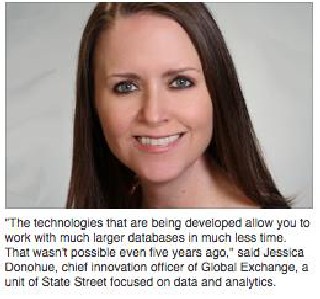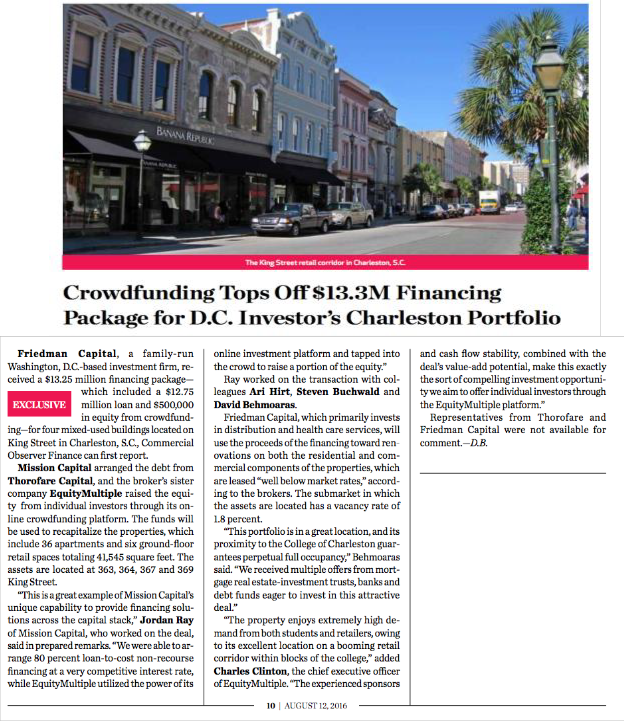Mission Capital’s David Tobin comments for how analytics are to be most effective, banks need a plan on how to use them.

Why Small Banks Need Big Data
September 6, 2016
Attention community bankers: it is time to dip your toes in the sea of data if you're not doing so already.
More than ever, banking is as much an information business as it is a financial business. With the vast amount of data banks have on customers and transactions and spending habits, those that aren't effectively mining this data risk falling into irrelevance.
For some small banks, investing in data analytics remains a tough call. Margins are already thin from the operating
environment. Tech budgets are consumed with bridging the gap between running legacy technology and offering digital products. Perhaps rightly so, they are afraid to sink money into a solution without fully understanding the problem they are trying to solve.
But it is a jump they must take in order to maintain their edge with customers.
"The reason [small banks] need to budget for this is because bigger banks are absolutely budgeting for this," said Karan Bhalla, managing director at IQR Consulting, which provides analytics and statistical modeling consulting services. "The rate of data being gathered now is huge and knowing things like how often customers log in to mobile banking … is redefining what loyalty is. If you don't understand that, then some other institution will and will take away customers.
Impactful Insights
Data analytics has become the Swiss Army knife of banking.
From customer marketing to regulatory compliance, from fraud detection to cybersecurity, data plays an integral role in banks' daily operations.
Take, for instance, compliance functions. In the past, banks typically had one group of people working on anti-money-laundering compliance and other groups working on different other types
of fraud. But banks now are seeking an enterprise-wide view of risk, and investing in analytics to get it.
"If you can pull all the data together, and use things like predictive analytics or machine learning to identify hotspots and where there might be potential trouble, you can fight fraud more effectively" said David Wallace, global financial services marketing manager at analytics technology provider SAS.
Indeed, analytics tools for compliance purposes, risk management and fraud prevention are among the most popular, Wallace said.
"When it comes to fighting fraud and financial crimes, and risk management, ultimately they are regulatory compliance activities, so it's all tied together," Wallace said. "All these things are prescribed by regulators, but banks need to do them to protect customers."
Wallace added that analytics can help banks identify and combat breaches and strengthen cybersecurity. Often, if there is a data breach it might take an institution "many months to figure out what's going on," he said. Deployed in a real-time streaming environment, advanced analytics can look inside a bank's network and find anomalies that previously may have gone undetected for lengthy periods of time, Wallace claim ed. For example, such analytics could spot systems interacting in atypical ways, such as a customer service system accessing a function that supervises the general ledger, he said.
Putting the 'Big' in Big Data
It is perhaps difficult for community bank executives to see how they can effectively use data analytics when they see what some of the larger banks are doing.
Consider the $251 billion-asset State Street's Global Exchange, a unit the bank created in 2010 dedicated to data and analytics. It has 700 employees.
As a custodian bank, State Street's clients are constantly asking for access to more data to help them operate more effectively, said Jessica Donohue, chief innovation officer of the division. Especially for regulatory compliance, and things like anti-money laundering and know-your- customer efforts, data analytics are essential.
"Analytics helps us provide our clients with a clean and clear view of risk across a complex portfolio," Donohue said. "A large asset owner, or a client with a complex banking book, needs to be able to look at risk holistically across their entire portfolio or book of business."
Those are services the bank wouldn't be able to provide effectively without analytics.
"Data does not start out being easy to use; it comes from a lot of different sources and the amount of it is very large. You need good analytics tools to bring that all together and serve up usable data."
Community banks might find comfort in knowing that Donohue thinks the industry has only scratched the surface of how it can improve through analytics tools designed to make sense of a seemingly infinite amount of data.
"I feel we are still at the beginning of this space," she said. "You're seeing a lot of the attention focus now on machine learning. The technologies that are being developed allow you to work with much larger databases in much less time. That wasn't possible even five years ago."
And the proliferation of analytics technology in recent years makes it easier for even small banks to start down this path, said Bhalla,
"Analytics tools are constantly being refined to mine more and more data in a more effective manner," he said. "For smaller institutions, it's much easier now to take that first step and invest in something that will give you basic intelligence. Then you can go from there and look at ROI and decide if you want to invest more, or hire quants or whatever. But there are many tools that run the gamut of varying cost, so it has to be a part of your budget, even a small part."
Don't Forget the Human Touch
Analytics tools need to be combined with expert human analysis to be most effective, said Todd
Hammond, head of commercial underwriting at Cleveland-based KeyBank.
When making credit decisions, generally the complexity and size of the loan will dictate how much the bank will rely on analytics.
"Analytics definitely plays a huge role, but reliance on it depends on the complexity of the deal," Hammond said. "Certain small-business loans can be largely data-driven. When you move up in the commitment spectrum, we'll still use analytics but there's also a human element, such as our interactions with the client and understanding of their standing in the market."
Human reasoning is also needed to make sure Key doesn't get in trouble for who it lends to. "We definitely have people looking at reputational risk, of who we can and can't lend to," such
as legal marijuana businesses, he said.
Still, Hammond said financial institutions will continue to do more with analytics as data becomes more large and complex.
"We want to know as much about our clients so we can sell them the right products," he said. "And it's also effective for not only helping us make credit decisions, but for monitoring the effectiveness of our lending strategy."
High Stakes
For analytics to be the most effective, banks need a plan for how to use them, said David Tobin, principal of Mission Capital Advisors.
"There's a huge amount of data that can be mined. You have to decide what you are mining for," he said. "The first thing banks really need to do is to need to establish a plan of action. Such as, 'what data from a regulatory requirement perspective do we need? What data could we mine for marketing purposes?' Then you go from there and rank all the opportunities and figure out how much you can do and how much it will cost for the right analytics tools."
This is particularly important for smaller banks that likely do not have large technology budgets. But even if the bank determines it can only spend a small amount, that's better than doing nothing.
"The pitfalls of not investing in your future as a bank far outweigh any benefits you might get in money saved from not investing," Tobin said.









